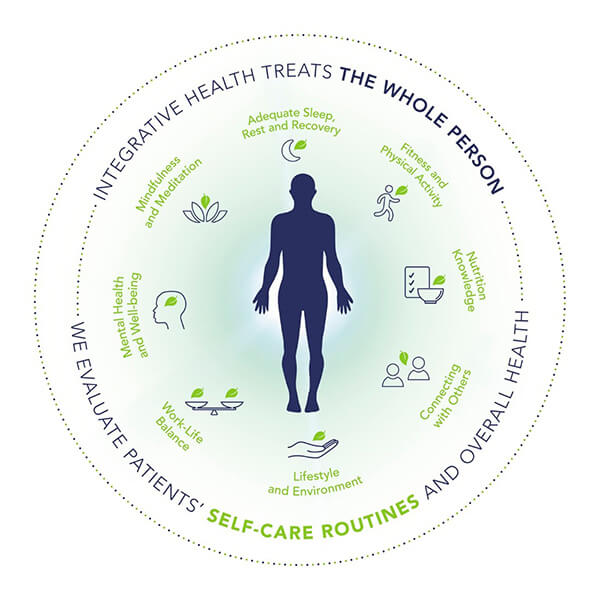About Integrative Health Care and Quality of Life

Integrative health is a holistic, patient-focused approach to healthcare and wellness, including mental, emotional, functional, social and community aspects. Patients who seek an Integrative health physician tend to experience difficult to treat conditions and have tried conventional treatments with little or no success of long-term improvement.
The Marcus Institute of Integrative Health at FAU Medicine combines a variety of evidence-based clinical services with the goal of meeting our patients’ health care needs.
Physicians Treat the Whole Person
Our physicians examine everything that makes up a patient’s health, including factors that can lead to disease, affect nutrition, exercise and stress. Integrative healthcare enhances current medical practice and improves patient care by balancing conventional and complementary approaches in a coordinated way. These approaches to healthcare provide well-coordinated care between medical providers, particularly with our Primary Care physicians at the FAU Medicine practice.
Ultimately, our patients and physicians are partners in the healing process, and as a result, all factors that influence a particular patient’s health and wellness are taken into consideration.
- Patient and practitioner are partners in the healing process.
- Emphasis on treating whole person to facilitate overall health and wellness
- Physicians use evidence-based complementary approaches to provide well-coordinated care between medical providers
- Delving into patients’ self-care routines facilitates a balanced treatment and prevention plan
Personalized Health Plan
Your medical history and overall health can be influenced by many self-care routines in your life such as work-life balance, lifestyle and environment, connections with others, as well as your approach to physical activity, sleep, nutrition, and mental health, among others. Our integrative health physicians delve into your unique experiences to develop a personalized plan that can impact your long-term health and well-being.

Attend Our Free Integrative Health Events
Discover a path to holistic well-being with our exceptional Integrative Health and Wellness events – available to Boca Raton and surrounding South Florida community members, absolutely free of charge. Join us throughout the year and embark on a transformative journey that nurtures your mind and body in perfect harmony.
Secure your spot now and sign up for our upcoming events!
Integrative Health Physician Services Offered
Common integrative health services include osteopathic manipulation and massage, yoga, meditation, culinary medicine, nutrition and dietary guidance, and IV therapy treatment. Patients may also seek integrative health services for conditions such as back, neck, or joint pain, arthritis, anxiety, cholesterol & heart disease, head or chest colds, other musculoskeletal issues, headaches and migraines, insomnia, cognitive health and the maintenance of memory, for example. Explore all of our physician services.

